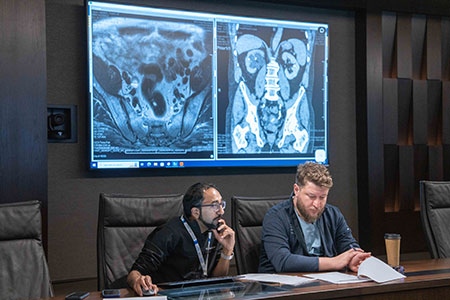Diagnosing Bladder Cancer
Health information and accurate diagnosis for bladder cancer.
 Bladder cancer is one of the most common cancers in the U.S., especially among men. It can completely alter the way you live your life if left undiagnosed or untreated.
Bladder cancer is one of the most common cancers in the U.S., especially among men. It can completely alter the way you live your life if left undiagnosed or untreated.
About seven out of every 10 bladder cancers are diagnosed at an early stage. Like any cancer, bladder cancer is most treatable — and even curable — when it is detected and treated at an early stage.
What are the symptoms of bladder cancer?
The most common symptom of bladder cancer is blood in the urine (Hematuria). And while this doesn’t necessarily mean you have bladder cancer it is a sign that you should see your doctor.
Other symptoms that could indicate you have bladder cancer include:
- An increased frequency in urination, or the opposite — not being able to empty your bladder because a tumor is obstructing the outflow of urine
- Not being able to empty your bladder because a tumor is obstructing the outflow of urine
- Painful urination
- Pelvic or back pain
Who is at risk for bladder cancer?
It's not always clear what causes bladder cancer, and some people with bladder cancer have no obvious risk factors.
We do know that the median age for developing bladder cancer is 70, and that your risk increases as you get older.
While it is more common in men, women are more likely to die from the disease — it may be related to a delayed diagnosis.
There are several factors that could increase your risk of bladder cancer, such as:
- Smoking, which causes about half of bladder cancer cases, according the American Cancer Society
- Exposure to certain chemicals from work in factories like aniline dyes, or exposure at hair salons, where stylists are regularly exposed to the chemicals in hair products
- Irritations inside the bladder, which may be the result of chronic inflammation or even the long-term use of a urinary catheter
- Personal or family history of bladder cancer, or a family history of hereditary nonpolyposis colorectal cancer, also called Lynch syndrome
How is bladder cancer diagnosed?
The only way to know for sure whether you have bladder cancer is for us to perform a cystoscopy. A cystoscopy involves a camera on a long, thin tube to be put into your bladder. This procedure allows us to perform a biopsy, where we take a sample of abnormal tissue from your bladder so it can be tested by our pathologists.
Other tests we use to aid in the diagnosis of bladder cancer include:
- Computed tomography (CT) scan
- Physical examination
- Urinalysis (a test of your urine for blood and cancer cells)
If your biopsy shows that you have bladder cancer, we will determine what type of bladder cancer you have, the stage of your cancer and other key information. Having an accurate diagnosis is critical because it guides our team in the creation of your personalized treatment plan.
What do bladder cancer grades mean?
Bladder cancer is presented in two grades: low and high.
- Low grade means the disease is superficial, or non-invasive, and has low potential to spread outside the bladder.
- High grade bladder cancer is invasive and has the potential to spread outside the bladder This can lead to the need for more invasive therapies.
Learn more about some of the most frequently asked questions about bladder cancer.
.svg?iar=0&hash=F6049510E33E4E6D8196C26CCC0A64A4)

/hfh-logo-main--white.svg?iar=0&hash=ED491CBFADFB7670FAE94559C98D7798)